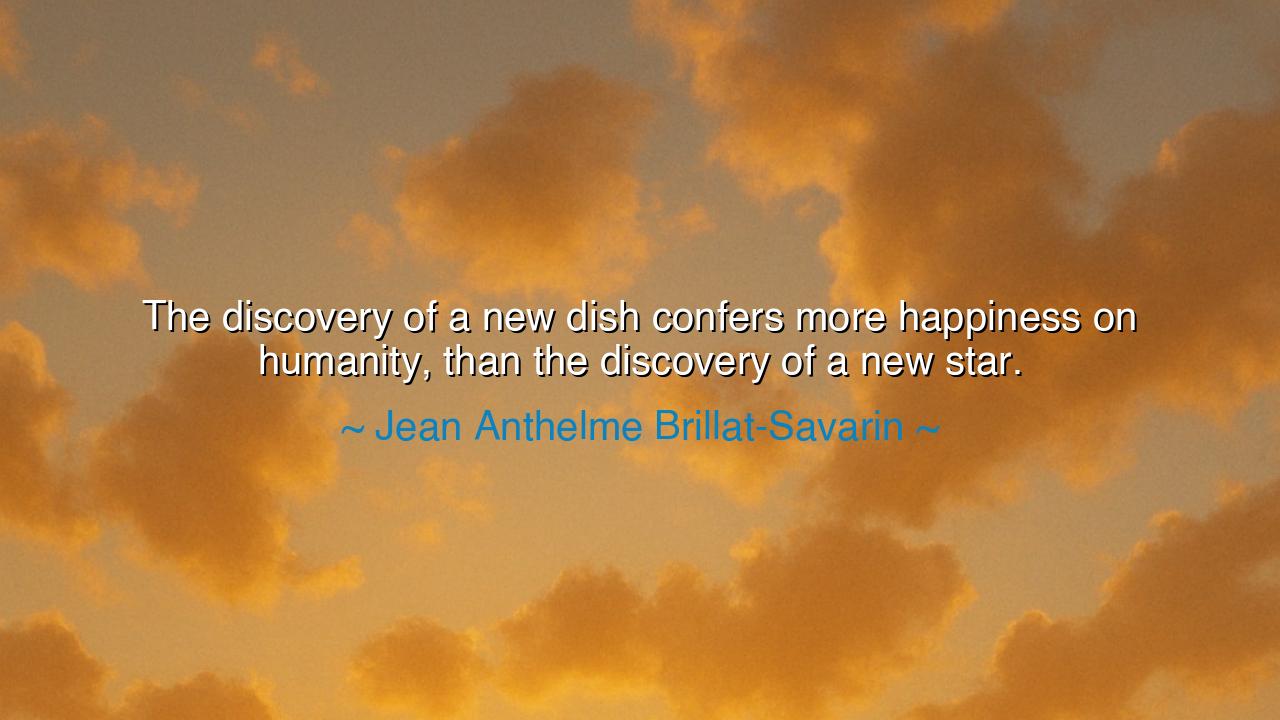
The discovery of a new dish confers more happiness on humanity
The discovery of a new dish confers more happiness on humanity, than the discovery of a new star.






The French philosopher and gastronome Jean Anthelme Brillat-Savarin, in his immortal Physiology of Taste, once proclaimed: “The discovery of a new dish confers more happiness on humanity, than the discovery of a new star.” These words, at first playful, conceal within them a deep and tender truth about human nature. For Brillat-Savarin was not merely speaking of food—he was speaking of the joy of earthly existence, of the simple pleasures that bind us to life and to one another. His wisdom reminds us that happiness is not always found in the distant heavens, but at the table before us, where warmth, nourishment, and companionship transform survival into celebration.
The meaning of this quote lies in its affirmation of the ordinary as sacred. To discover a new star may expand the boundaries of knowledge, but it does not fill the stomach nor gladden the heart. A new dish, on the other hand—a new way of preparing the bounty of the earth—touches the soul of every person, rich or poor, learned or simple. It is a discovery that enters the daily rhythm of human life. Brillat-Savarin understood that food is love made visible, that it unites the body and spirit, and that the pleasures of the palate are not vulgar indulgences but reflections of divine creation. To savor a meal is to participate in the eternal act of giving and receiving joy.
This insight was born from the world Brillat-Savarin lived in—a France reborn from revolution, where hunger and opulence existed side by side. He saw that civilization itself was shaped by its table. The way people cook and share food reveals who they are: their patience, their artistry, their compassion. In a time when science was charting the stars and expanding the frontiers of reason, he turned his gaze to the more intimate frontier of taste, declaring that culinary discovery nourishes humanity more profoundly than the distant light of a star ever could. For what use is the knowledge of the cosmos if man forgets the art of being happy upon the earth?
History offers countless examples that echo his wisdom. When Catherine de’ Medici brought her chefs from Florence to France in the sixteenth century, she unknowingly transformed not only French cuisine but French culture. The refinement of sauces, the delicacy of pastries, the balance of flavor and art—these inventions changed how people gathered, spoke, and loved. A single dish could bridge classes and nations; it could soothe sorrow or seal friendship. In such acts of creation and sharing, one sees what Brillat-Savarin meant: that the discovery of a dish—a new way to give pleasure and sustenance—creates joy that endures in the hearts of the living, while the discovery of a star shines coldly from afar.
Yet his words do not scorn science; they elevate human connection above abstraction. A star may enlighten the mind, but a meal enlightens the soul. The astronomer gazes upward in solitude, but the cook gathers others around him. The one expands the universe; the other deepens the meaning of life within it. The discovery of a dish is not simply culinary—it is an act of generosity. It invites others to taste, to share, to linger. It is, in essence, the discovery of how to love better through creation.
Brillat-Savarin’s philosophy thus teaches us that happiness is not a lofty, distant thing—it is immediate, tangible, found in the warmth of a kitchen, the laughter of friends, the comfort of flavor. It asks us to cherish the senses, to honor the humble miracles that sustain us daily. For when we cook with care or eat with gratitude, we participate in one of humanity’s oldest forms of communion. In every shared dish lies the memory of countless generations who, through fire and hunger, learned to transform necessity into joy.
And so, the lesson we draw is simple yet profound: seek not happiness only in great discoveries or distant dreams, but in the living art of appreciation. Savor your meals. Create beauty in the small acts of your day. Remember that to cook for another, or even to share a loaf of bread, is to affirm life itself. The stars may inspire awe, but the table reminds us we belong—to the earth, to one another, to the timeless rhythm of giving and receiving joy. As Brillat-Savarin teaches, a well-made dish does more than please the palate—it nourishes the soul, and in doing so, gives birth to the most solid and enduring happiness humanity can know.






AAdministratorAdministrator
Welcome, honored guests. Please leave a comment, we will respond soon